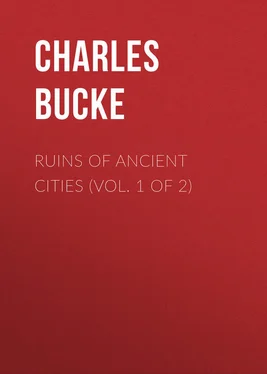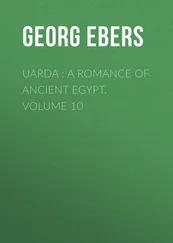Charles Bucke - Ruins of Ancient Cities (Vol. 1 of 2)
Здесь есть возможность читать онлайн «Charles Bucke - Ruins of Ancient Cities (Vol. 1 of 2)» — ознакомительный отрывок электронной книги совершенно бесплатно, а после прочтения отрывка купить полную версию. В некоторых случаях можно слушать аудио, скачать через торрент в формате fb2 и присутствует краткое содержание. Жанр: foreign_antique, foreign_prose, на английском языке. Описание произведения, (предисловие) а так же отзывы посетителей доступны на портале библиотеки ЛибКат.
- Название:Ruins of Ancient Cities (Vol. 1 of 2)
- Автор:
- Жанр:
- Год:неизвестен
- ISBN:нет данных
- Рейтинг книги:4 / 5. Голосов: 1
-
Избранное:Добавить в избранное
- Отзывы:
-
Ваша оценка:
- 80
- 1
- 2
- 3
- 4
- 5
Ruins of Ancient Cities (Vol. 1 of 2): краткое содержание, описание и аннотация
Предлагаем к чтению аннотацию, описание, краткое содержание или предисловие (зависит от того, что написал сам автор книги «Ruins of Ancient Cities (Vol. 1 of 2)»). Если вы не нашли необходимую информацию о книге — напишите в комментариях, мы постараемся отыскать её.
Ruins of Ancient Cities (Vol. 1 of 2) — читать онлайн ознакомительный отрывок
Ниже представлен текст книги, разбитый по страницам. Система сохранения места последней прочитанной страницы, позволяет с удобством читать онлайн бесплатно книгу «Ruins of Ancient Cities (Vol. 1 of 2)», без необходимости каждый раз заново искать на чём Вы остановились. Поставьте закладку, и сможете в любой момент перейти на страницу, на которой закончили чтение.
Интервал:
Закладка:
Pyrrhus, as long as the place afforded him a sufficient extent of ground, appeared with a resolute mien, and frequently faced about and repulsed those who pursued him; but when he found himself engaged in a narrow street, which ended at the gate, the confusion, which already was very great, became infinitely increased by the arrival of the troops his son brought to his assistance. He frequently called aloud to them to withdraw, in order to clear the streets, but in vain; for as it was impossible for his voice to be heard, they still continued to advance; and to complete the calamity in which they were involved, one of the largest elephants sank down in the middle of the gate, and filled the whole extent in such a manner, that the troops could neither advance nor retire. The confusion occasioned by this accident became then inextricable.
Pyrrhus observing the disorder of his men, who broke forward and were driven back, took off the glittering crest, which distinguished his helmet, and caused him to be known, and then, confiding in the goodness of his horse, he sprang into the throng of his enemies who pursued him; and while he was fighting with an air of desperation, one of the adverse party advanced up to him, and pierced his cuirass with a javelin. The wound, however, was neither great nor dangerous, and Pyrrhus immediately turned upon the man from whom he had received it, and who happened to be only a private soldier, the son of a poor woman at Argos: the mother beholding the contest from the top of a house, where she stood with several other women. The moment she saw her son engaged with Pyrrhus, she almost lost her senses, and chilled with horror at the danger to which she beheld him exposed. Amidst the impressions of her agony, she caught up a large tile, and threw it down upon Pyrrhus. The mass fell directly upon his head, and his helmet being too weak to ward off the blow, his hands dropped the reins, and he sank down from his horse without being observed. But he was soon discovered by a soldier, who put an end to his life, by cutting off his head.
There is another circumstance related of Argos, which it gives us great pleasure in remarking. When Solon was at the court of Crœsus, the king asked him – "Who, of all those he had seen, was the next in felicity to Tellus." Solon answered, 'Cleobis and Biton of Argos, two brothers, who had left behind them a perfect pattern of fraternal affection, and of the respect due from children to their parents. Upon a solemn festival, when their mother, a priestess of Juno, was to go to the temple, the oxen that were to draw her not being ready, the two sons put themselves to the yoke, and drew their mother's chariot thither, which was above five miles distant. All the mothers of the place, ravished with admiration, congratulated the priestess on the piety of her sons. She, in the transports of her joy and thankfulness, earnestly entreated the goddess to reward her children with the best thing that Heaven can give to man. Her prayers were heard. When the sacrifice was over, her two sons fell asleep in the very temple, and there died in a soft and peaceful slumber. In honour of their piety, the people of Argos consecrated statues to them in the temple of Delphos.
"If Athens," says Dr. Clarke, "by arts, by military talents, and by costly solemnities, became one of the eyes of Greece , there was in the humanity of Argos, and in the good feeling displayed by its inhabitants, a distinction which comes nearer to the heart. Something characteristic of the people may be observed even in a name given to one of their divinities; for they worshipped a 'God of Meekness.' It may be said, perhaps, of the Argive character, that it was less splendid than the Athenian, and less rigid than the Lacedæmonian; but it was less artificial, and the contrast it exhibited, when opposed to the infamous profligacy of Corinth, where the manners of the people, corrupted by wealth and luxury, were further vitiated by the great influx of foreigners, rendered Argos, in the days of her prosperity, one of the most enviable cities of Greece. The stranger, who visited Athens, might, indeed, regard, with an eager curiosity, the innumerable trophies every where suspended of victors in her splendid games; might admire her extensive porticoes crowded with philosophers; might gaze with wonder at the productions of her artists; might revere her magnificent temples: but feelings more affecting were drawn forth in beholding the numerous monuments of the Argives, destined to perpetuate the memory of individuals who had rendered themselves illustrious by their virtues."
Argos was taken, A. D. 1397, by Bajazet. It was then totally deserted, and its walls destroyed. It was rebuilt by the Venetians, from whom, in 1463, it was taken by the Turks; and after being retaken by the Venetians, it was again recovered by the Turks in the same year.
"But where is Argos?" inquires La Martine; "a vast naked plain, intersected with marshes extending in a circular form at the bottom of the gulf. It is bounded on every side by chains of grey mountains; at the end of the plain, about two leagues inland, we perceive a mound, with some fortified walls on its summit, and which protects, by its shade, a small town in ruins – this is Argos. Close by is the tomb of Agamemnon."
The antiquities of Argos, once so numerous, may now be comprised within a very short list. Those seen by Pausanias were the temples of Apollo, of Fortuna, of Jupiter, and of Minerva; sepulchres and cenotaphs; a theatre, a forum, a gymnasium, a stadium, a subterranean edifice, &c., formed of earth.
Of these now remaining 36 36 Clarke.
, are the ruins of the theatre 37 37 The devastations of time and war have effaced the old city. The stranger in vain inquires for vestiges of its numerous edifices, the theatre, the gymnasium, the temples, and the monuments it once boasted, contending even with Athens in antiquity and in favours conferred by the gods. – Chandler.
, which was a remarkable structure, having been entirely an excavation in the rock, and having the appearance of three theatres instead of one. Opposite to this are the remains of a large edifice, built entirely of tiles. Above the theatre are those of the Hieron of Venus, within whose temple was a statue of the poetess Telesilla, who, at the head of a band of heroines, repulsed from the walls the enemies of her country, when it was attacked by the Lacedæmonians. She was represented, says Pausanias, standing upon a pillar, with the books of her poetry scattered at her feet, in the act of regarding her helmet, which she was about to put upon her head.
On the sides and lower part of the modern fortress are still seen the remains of Cyclopian architecture, as ancient as the citadel of Tiryns, and built in the same style 38 38 See Tiryns.
.
"This structure," says Dr. Clarke, "is mentioned by Pausanias 39 39 Lib. vii.
, where he states that the inhabitants of Mycenæ were unable to demolish the walls of the Argives, built, like those of Tiryns, by the Cyclops. These Cyclopian walls, as well as the towers of Argos, are noticed by Euripides, Polybius, Seneca, Strabo, and Statius. They are also hinted at by Virgil. At the front of the Acropolis, we found one of the most curious tell-tale remains, yet discovered among the thirty temples of pagan priestcraft. It was nothing less than one of the oracular shrines of Argos, alluded to by Pausanias, laid open to inspection like the toy a child has broken, in order that he may see the contrivance whereby it was made to speak. A more interesting sight for modern curiosity can hardly be conceived to exist among the ruins of any Grecian city. In its original state, it has been a temple; the farther part from the entrance where the altar was, being an excavation of the rock, and the front and roof constructed of baked tiles. The altar yet remains, and part of the fictile superstructure; but the most remarkable part of the whole is a secret subterraneous passage, terminating behind the altar, its entrance being at a considerable distance towards the right of a person facing the altar, and so cunningly contrived, as to have a small aperture easily concealed, and level with the surface of the rock. This was barely large enough to admit the entrance of a single person, who, having descended in the narrow passage, might creep along until he arrived immediately behind the centre of the altar; where being hid by some colossal statue, or other screen, the sound of his voice would produce a most imposing effect among the humble votaries prostrate beneath, who were listening in silence upon the floor of the sanctuary."
Интервал:
Закладка:
Похожие книги на «Ruins of Ancient Cities (Vol. 1 of 2)»
Представляем Вашему вниманию похожие книги на «Ruins of Ancient Cities (Vol. 1 of 2)» списком для выбора. Мы отобрали схожую по названию и смыслу литературу в надежде предоставить читателям больше вариантов отыскать новые, интересные, ещё непрочитанные произведения.
Обсуждение, отзывы о книге «Ruins of Ancient Cities (Vol. 1 of 2)» и просто собственные мнения читателей. Оставьте ваши комментарии, напишите, что Вы думаете о произведении, его смысле или главных героях. Укажите что конкретно понравилось, а что нет, и почему Вы так считаете.












